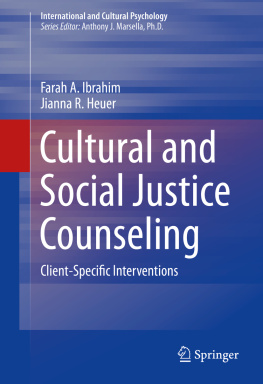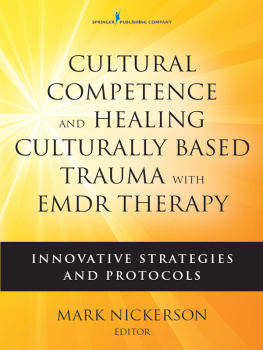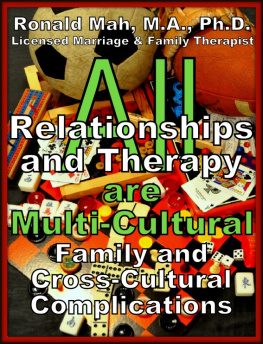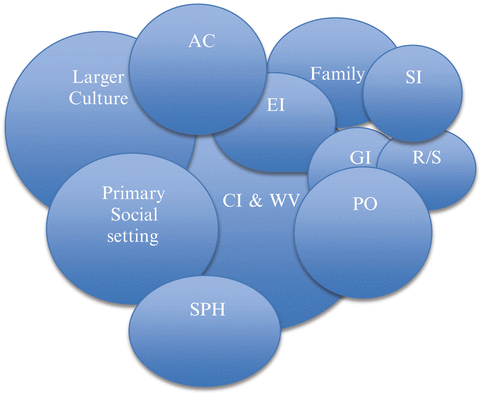1. Social Justice and Cultural Responsiveness in Counseling Interventions: Using Cultural Assessments
Introduction and Overview
This chapter provides an overview of the variables necessary for conducting a cultural assessment for counseling and psychotherapy to provide services with competency in both social justice interventions and cultural responsiveness. Guidelines and competency statements of all mental health professional organizations require attention to these issues, i.e., American Counseling Association (ACA, shows all the variables that influence an individuals cultural identity and worldview.
Fig. 1.1
Factors influencing cultural identity and worldview. Key : CI cultural identity, WV worldview, AC acculturation, EI ethnic identity, GI gender identity, PO privilege and oppression, R / S religion/spirituality, SI sexual identity, SPH sociopolitical history
Cultural Identity
Cultural identity is a persons sense of self, developed within a familial, social, cultural, and political world and is influenced by several variables. Psychological theories have evolved significantly in the last 40 years to recognize that identity, which was considered a unitary model known as self-identity (Burke, ).
The social construction of identity as noted in psychological reports that describe a client as John is a Black male places the emphasis on color and considers a client only from the perspective of race or ethnicity and gender. This stance is limited in identifying all the influences that form identity. Ibrahim () notes that various aspects of identity may be significant to the specific presenting problem, as context changes and how people relate to an issue. This text focuses on helping counselors and therapists in identifying all the relevant variables that will affect goals and processes for counseling to make the intervention culturally relevant, sensitive, and meaningful to a client.
The issue of cultural identity and context was formalized in the Diagnostic and Statistical Manual-IV (DSM-IV, APA will elaborate on these variables.
Worldview
Initially cultural efficacy was linked with understanding the clients worldview (Ibrahim, ). Both these theories address issues of collectivism and individualism, and the influence of the socialization process, based on cultural context. In the social sciences, the concept of worldview was considered important in sociological and anthropological theories and research. Focusing on identifying the differences between people socialized in collectivistic or individualistic cultural systems. Historically, societies of Asian, African, Middle Eastern origin were and still tend to be closer to the collectivism end of the continuum, and Western Europe and Europe in general, tends to be toward the individualism end of the continuum with variations based on locale, sociopolitical history, religion, and culture. Locus of Control theory posits that socialization in a collectivistic system leads to an external locus of control, whereas socialization within individualistic cultural systems leads to an internal locus of control. Similarly Attribution Theory posits that attribution of control over assumptions, ways of decision-making and problem-solving, is influenced by the social system (collectivistic), or the assumption is that responsibility for attribution of control, assumptions, ways of decision-making, etc., rests with an individual, even when people do not have control over their world (individualism).
Ibrahim (.
Why Focus on Worldview and Cultural Identity?
Understanding the importance of core values and cultural identity in all its complexity will help clinicians when counseling in a culturally sensitive and relevant manner in a diverse society. However, other critical variables that pertain to issues of social justice and equity need to be incorporated to understand the clients reality in social systems where there are dominant and nondominant cultural groups based on race, ethnicity, gender, sexual orientation, social class, religion, age, life stage, ability/disability. In hierarchical social systems, the issue of privilege (opportunities available on the basis of race/ethnicity, gender, sexual orientation, etc.) helps in identifying issues of privilege and oppression (Gorski & Goodman, ).
Privilege and Oppression
Clients perceptions of their place in social systems, and what they believe they can and cannot do, can be immensely helpful in counseling and psychotherapy. This analysis will help us in determining if the privilege and oppression identified by the client is based on societal conditions, published reports in the psychological literature, newspaper stories, statistics on poverty, racism and sexism, occupational accident and absentee reports, etc. Or does the client have the means to do more with his or her life, than he or she believes. Clients who lack access to opportunities to achieve the good life have been treated negatively in counseling and psychotherapy on the basis of race, gender identity, sexual orientation, culture, age, religion, social class, and disability due to the inability of mental health professionals to understand their challenges and limitations, given that the education and training of clinicians and educators does not specifically focus on understanding these dimensions (Dana, ).
The lack of emphasis on social justice and equity issues in training is responsible for this oversight by professionals. In addition Nagayama Hall, Lopez, and Bansal ().
The emphasis in training programs needs to go beyond cultural competence, to helping students understand, and have the ability to identify privilege and oppression issues in society, which are external factors that induce mental illness, and many physical ailments, and psychological problems such as race-related trauma, PTSD as a result of being a member of a lower social class, or being a minority in a dominant culture (Dohrenwend, ).
The stress associated with not being a valued gender, or from a lower social class, or different nationality, or cultural group is always much higher than for others with the same credentials, because other factors attributed to difference can result in reducing their credibility as social equals, workers, partners, etc. (Conwill, .
Acculturation
Acculturation and adaptation processes can help or hinder successful integration into a cultural system (Berry, ), note that the concept of acculturation to the dominant culture, implies that diversity and dissent will not be tolerated, which can be very oppressive for nondominant populations coming from cultural systems that may be very different.
Acculturation or lack of it, to the larger social system, or identification, with or rejection of primary cultural group can provide very important insights into how comfortable the client is with his or her world, and how much stress is experienced, as the client negotiates everyday life (Ibrahim & Ohnishi, .











